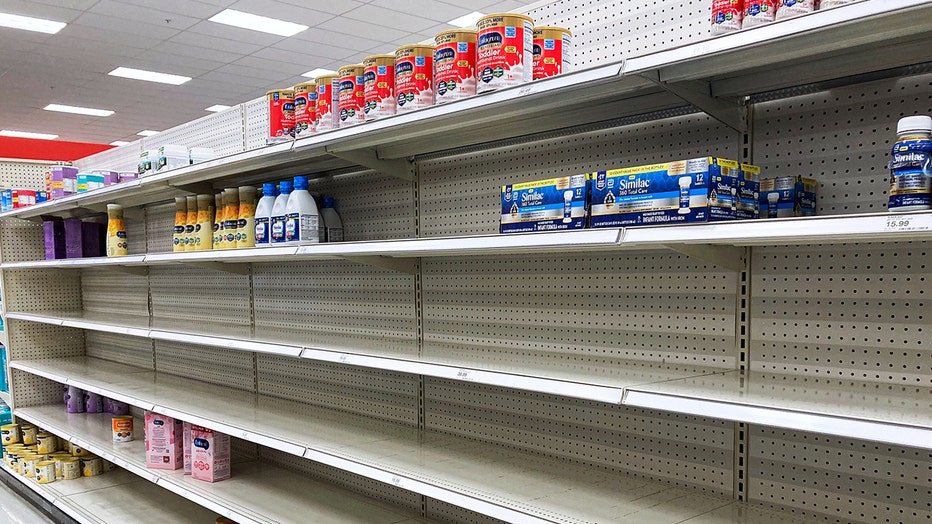Baby formula shortage: Out-of-stock rate continues to worsen, jumping to 73.5%
Baby formula shortage: Doctor provides advice for parents
Baby formula has become scarce on store shelves as the U.S. now faces more shortages amid supply chain backlogs.
The baby formula shortage continues to impact many families and worsen as formula makers and the U.S. Food and Drug Administration (FDA) investigate what led to the national crisis.
For the week of May 22-May 29, the out-of-stock rate for infant formula jumped to 73.58% nationwide, according to recent data by analytics firm Datasembly. This is nearly 4% higher than last week and is a significant increase from two weeks ago when the out-of-stock rate stood at 45%.
Why is baby formula still in short supply?
The problem was initiated by supply chain disruptions, which have caused major delays among retailers and companies. This has also caused stores to put limitations on how much baby formula customers can buy.
A safety recall issued earlier this year has also compounded these challenges.

A nearly empty baby formula display shelf is seen at a store in Orlando. (Photo by Paul Hennessy/SOPA Images/LightRocket via Getty Images)
In February, the Food and Drug Administration warned consumers to avoid some powdered infant formula products from a Sturgis, Michigan, facility run by Abbott Nutrition, which then initiated a voluntary recall.
According to findings released in March by federal safety inspectors, Abbott failed to maintain sanitary conditions and procedures at the plant.
RELATED: What's driving the baby formula shortage
Abbott Nutrition's Sturgis, Michigan, facility, which exacerbated the industry-wide shortage, is expected to restart production Saturday, but this still means products from the plant won't return to store shelves until at least mid-July, according to the company's production timeline.
Nestle is currently helping to ease the shortage by transporting Gerber baby foods from the Netherlands and Alfamino from Switzerland to the United States.
RELATED: Nestle flies baby formula to US from Europe to ease shortage
A Nestle spokesperson in a statement to FOX Television Stations said: "We have brought in Gerber Good Start Extensive HA from the Netherlands and Alfamino from Switzerland for Nestle Health Science. We prioritized these products because they serve a critical medical purpose as they are for babies with cow’s milk protein allergies. Of note, both products were already being imported so we were able to act quickly. We moved shipments up and rushed via air to help fill immediate needs."
Nestle did not specify how much formula they shipped to the U.S.
Where can I find infant formula?
"My advice in the time of formula shortages is not to be brand specific," Steven Miller, a pediatric gastroenterologist at Johns Hopkins Children’s Center, told FOX. "This means that you can look around for other brands or store brands, which are often very good."
Experts say generic formulas are also FDA-approved and meet the same requirements as brand names. In addition, no generic formulas were impacted in February’s recall.
If you’re still struggling to find formula or your baby requires a specific brand, experts suggest talking with your pediatrician or calling a local food bank to see if they can help locate some options.
They also recommend checking with smaller stores and pharmacies, which may still have supplies when larger stores run out.
Infant formula can also be very costly, so for families who qualify based on income, Women, Infants and Children (WIC), a federal program like food stamps that serves to help families, can provide formula, free of charge.
RELATED: Baby formula vs. breast milk: Doctors explain what parents should do amid formula shortage
Doctors also suggest seeking out local groups online. Many local parent groups have postings about unopened, unexpired formula canisters available to give away or sell. During this time, experts say it’s okay to look for formula online, but check that it is sold by a reputable supplier, unopened and unexpired.
Bottom line: Blanco says if you cannot find any formula at all to call your pediatrician or local hospital.
"There is not a parent that we have not been able to help," Dr. Cynthia Blanco, a neonatologist in Texas and a member of the American Academy of Pediatrics (AAP) told FOX Television Stations.
FOX News contributed to this story.

